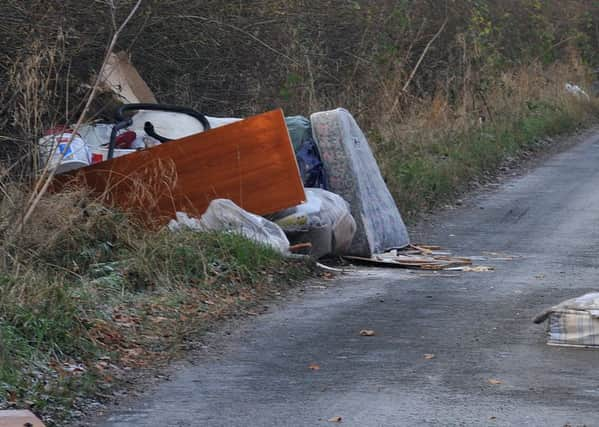Alastair Collin: Waste dumping is a crime, a dangerous eyesore and costly to clean up


Aside from being unsightly, fly-tipping is a source of pollution, a danger to wildlife and might affect properly-conducted waste management businesses who find themselves undercut by those not complying with the law.
In Scotland, the main legislation concerning fly-tipping is the Environmental Protection Act 1990 (the “Act”) The key provisions are as follows:-
Advertisement
Hide AdAdvertisement
Hide AdIt is a criminal offence under the Act to deposit waste or knowingly permit (which equates to turning a blind eye) waste to be deposited in or on any land unless the deposit is in accordance with a waste management licence. Fines are potentially unlimited and there is provision too for custodial sentences of up to five years.
The Scottish Environment Protection Agency (SEPA) has power under the Act to require the occupier of land to remove waste. Any occupier failing to comply with the notice could be liable to a fine of up to £5,000 (plus additional fines for every day of non-compliance). The recipient may appeal to the court to have the notice invalidated and, for this to happen, the court would need to be content that the occupier neither deposited or knowingly permitted the deposit of waste. Alternatively, SEPA can remove the waste and recover costs of removal from any person who deposited or knowingly permitted the deposit of waste. Interestingly, while the Environment Agency can require the owner to remove waste in England and Wales there is no direct equivalent of this provision in Scotland that allows SEPA to require the owner (as opposed to the occupier) of land to remove waste.
Commercial waste carriers or brokers have to apply to SEPA for a permit to legally carry or dispose of waste.
The Act imposes “cradle to the grave” responsibility for waste with any business producing, importing, keeping, storing, transporting and treating or disposing of waste being required to take all reasonable steps to ensure that waste is managed properly.
If waste is handed over to another party it is vital to check that the transferee is a registered waste carrier. The Scottish Government’s “Duty of Care – A Code of Practice” of 2012 states that at a minimum the transferring party should ask for: A copy of the carrier’s registration certificate and check this against SEPA’s online public register to confirm that it is genuine and valid; confirmation of any broker/dealer’s registration and check this against SEPA’s public register; and the reference number of the receiving site’s Licence or Permit so that this can be checked with SEPA’s local teams to confirm it is genuine and valid and that it allows for the deposit of your type of waste.
Waste transfer notes (forms giving a description of the waste) have to be completed and retained for two years by both parties, either individually in respect of single loads or with a “season ticket” applying to a series of loads.
There are a number of steps that landowners and managers of land can take to prevent fly-tipping including the following: installing gates and barriers and improving visibility of site entrances; keeping areas tidy and removing fly-tipped waste quickly or reporting fly-tipping promptly; installing CCTV in the worst affected areas; sharing information with neighbours.
If landowners see illegal dumping, call the Dumb Dumpers Stop Line (0845 2304090), use the Flymapper app: www.zerowastescotland.org.uk/litter-flytipping/flymapper or visit www.dumbdumpers.org
Alastair Collin is a senior associate with Turcan Connell